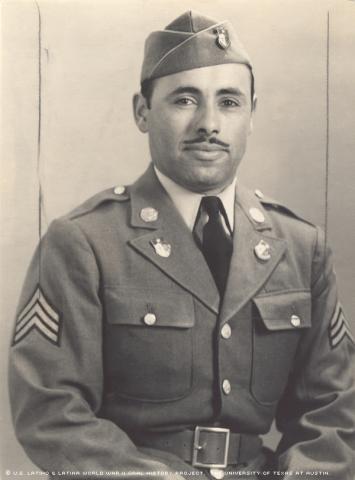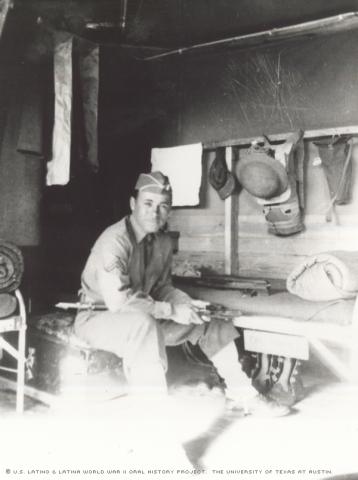

By Cheryl Smith Kemp
Ninety-year-old Rafael Torres doesn’t have the mind he had back when he was growing up in El Paso, Texas, nor when he began penning his memories of World War II, but he still seems to remember quite clearly the torture of the head injury that eventually brought him home from the war.
Torres recalls going down Mount Rotondo near San Pietro, Italy, with the rest of his platoon on Dec. 15, 1943. Being assigned to rear guard duty, no one was behind him.
“Although I usually carried my weapon with two hands ready for action, on this day I grabbed my rifle with my right hand only and I turned my head to see if the platoon that had been following us was still in place. However, just then, WHAM!!! I didn’t hear the wham, or anything else for that matter. When I opened my eyes, I found myself lying down with my face in the dirt, without knowing why, without even thinking about it, or even wondering why. One moment I was walking, a split second later, I was down flat on my face, without the slightest idea that something had happened to me,” writes Torres in Chapter 35 of his unpublished memoir.
“I don’t know how long I sat there or lay there without any pain. I was wondering, ‘What is happening?’ I didn’t hear anything. … I was alive, and a few minutes later, I was out,” stuttered Torres, a victim of Alzheimer’s, during a 2005 interview.*
*********
Next thing he knew: “My face was in the mud and I had to raise my face constantly.”
He recalls being desperate for air, as well as his punctured helmet slipping off, revealing a small pool of blood.
And all of a sudden, “everything hurt,” he said. … “One GI stopped to help me, and I told him, ‘Please, turn me on my back,’” to which Torres recalls the GI responding he wasn’t supposed to because it might hurt Torres.
“But I can’t breathe,” Torres remembered replying.
*********
Eventually, medics arrived and put Torres on a stretcher, on which they carried him up the mountain.
“They were resting and then the Germans started bombarding us,” he said.
*********
Somehow, they made it to a medical tent/operating room, or, as Torres put it during his interview, “a tent with a bright light.”
Torres asked for a chaplain, Father Fenton, who he knew from training back at Camp Bowie in Fort Worth, Texas, but says he was told he wasn’t available. Torres then recalls being loaded into an ambulance for a bumpy ride from hell.
“It seemed to me that every time one of the wheels hit a pothole, or a protruding stone[,] my fractured left arm would be slammed against the metal wall of the ambulance, resulting in a stab of excruciating pain,” Torres writes.
After a while, he started vomiting.
“I hadn’t eaten since morning, and now it’s almost midnight,” Torres said.
*********
Next thing he remembers is being carried on a stretcher into a tent, a field hospital somewhere in Italy. There was “a bright light … and a nurse was washing my face,” he said.
Torres recalls waking up later in a recovery room.
“I felt that it was Tuesday,” he said. … “She gave me a shot, and, another time, I was gone.”
*********
After fading in and out of consciousness for a series of days, Torres awoke. It was Christmas. He recalls people trading cigarettes and other items.
At least a couple of days later, he says he was moved to the 300th General Hospital in Naples.
“When the bombs were falling, they’d just scramble … many patients would get under the bed,” said Torres, who couldn’t walk.
He heard somebody say to somebody else, “Don’t worry, it’s going to be over soon. … [But] almost all night, the Germans came,” he said, contradicting his written account, in which he notes the air raids he experienced while in the hospital didn’t last long.
Then one morning, a nurse told Torres he was being “evacuated to a hospital in North Africa,” he writes. …
“As the GIs lifted the stretcher off the floor[,] the nurse[,] an Angel of Mercy[,] reached down and kissed me on my forehead[,] saying ‘God bless you[,]’ or something like it, and the GIs started walking away. As soon as we were outside, I saw several ambulances, and I was placed inside one of them.”
The ambulance took Torres to an airport, where he was transferred to a wire basket to be loaded onto a plane. As luck would have it, the Germans began
an air raid on the area at that point, so Torres says he was moved in his basket to a trench near the airstrip.
“I saw two German planes. One was coming too low … [I was] afraid they would strafe us,” said Torres during his interview, adding that he then saw three American planes, at which point people yelled, “hooray!”
*********
Torres landed in North Africa, where he was taken to the 37th General Hospital in Bizerte, Tunisia.
“I stayed there a long time,” he said.
Five or six weeks into Torres’ stay there, a doctor and nurse removed his waist-up body cast.
“I started walking, holding onto beds,” said Torres, who recalls getting castigated by a nurse who caught him hobbling from one cot to another. “You’re a patient. You’re supposed to be in bed,” he remembered her saying. …
“It turned into kind of a game,” he said of sneaking in visits to other patients’ bedsides.
After a while, Torres recalls being transferred to a replacement depot near North Africa’s Oran, at which point he was sent back to the United States. Sergeant Torres was officially discharged from Brooke General Hospital at Fort Sam Houston in San Antonio, Texas, on Sept. 13, 1944. For his service, he earned the Purple Heart, two Bronze Stars, a WWII Victory medal and a European-African-Middle Eastern Campaign medal with one star, among other honors.
*********
Torres eventually went to work for the Army as an accountant at White Sands Missile Range in New Mexico.
A former gas-station hand and employee of the government’s Civilian Conservation Corps during the Great Depression, Torres had been craving economic stability for a long time, at least according to his Pre-Interview Form. In the box for activities and interests before the war, “a steady job, to have one,” is the only thing written.
Mr. Torres was interviewed in El Paso, Texas, on May 27, 2005, by Robert Rivas and Torres’ son, Hector A. Torres.
*According to a report released Sept. 21, 2009, by Alzheimer's Disease International (www.alz.co.uk), a global federation of 71 Alzheimer associations, 6.9 percent of the over-60 population in North America (the United States and Canada, for the this report) will suffer from dementia by 2010. And from 2010 to 2050, that number is estimated to increase 151 percent.

